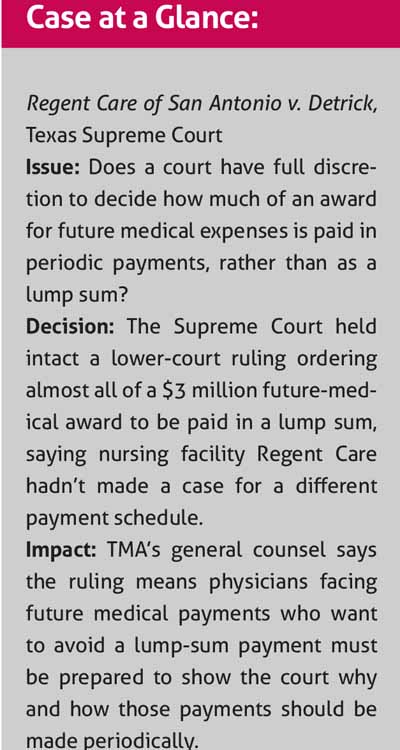
Tort reform was about making Texas a place where physicians want to practice medicine. Part of that was ensuring a negligence lawsuit wouldn’t necessarily bankrupt a doctor.
To that end, a recent Texas Supreme Court opinion helped clarify a piece of the landmark 2003 medical liability reforms.
The decision didn’t exactly go medicine’s way. But it did preserve lawsuit-losing physicians’ ability to provide input on how much of an award for future medical expenses should be paid in installments, versus a potentially devastating lump sum payment.
The Supreme Court in May ruled against a skilled-nursing facility on the issue of “periodic payments” covering the cost of future medical care. The Texas Medical Association supported the facility, Regent Care of San Antonio, in its fight against a lower-court order requiring Regent to pay more than 90% of a $3 million award in one gulp.
The state law allowing defendants in negligence suits to request periodic payments for future medical expenses was part of tort reform, and TMA wanted to make sure that piece of the law stayed intact.
Under the high court’s decision, it does. But TMA’s Office of the General Counsel says the defendant has to supply evidence to trial courts on what portion of the money should be paid over time, and why.
In other words, says Edinburg gastroenterologist and TMA Past President Carlos J. Cardenas, MD, “you have to put your cards on the table” when it comes to making the case for installments.
“Certainly, periodic payments are reasonable, and the periodic payments are at least predictable,” said Dr. Cardenas, who remembers the pre-tort reform days of rampant lawsuits and verdicts in the Rio Grande Valley. “For folks that are in the business of providing care, it’s important to have budgets that you can predict.”

Proper compensation
The fight over periodic payments stemmed from a 2017 Bexar County district court decision awarding Robert Detrick and his wife, Carolyn, just under $3.4 million, including $3 million in damages for future medical care. The Detricks sued Regent over care Mr. Detrick had received in 2013. Mr. Detrick died 16 months after the trial court decision.
Regent asked the court for all future-medical damages to be paid over time. But the court allowed the facility to pay only $256,358 in periodic payments and required Regent to pay about $2.7 million in a lump sum. Regent appealed that decision to the 4th Court of Appeals, which agreed with the trial court. (See “Taking their Lumps?” March 2020 Texas Medicine, pages 33-34, www.texmed.org/takingtheirlumps.)
When the case moved to the Texas Supreme Court, TMA supported Regent Care with a friend-of-the-court brief, asking justices to reverse the lower courts’ decisions. TMA said determinations of lump-sum awards and scheduled payments must be supported by the evidence, such as if the patient’s “economic needs are greater earlier in life than later.” TMA argued that the patient suing has the responsibility to provide that evidence, not the physician or facility on the losing end of the lawsuit.
“The fundamental goal is to match losses with compensation to ensure that money paid to an injured [patient] will be available when the [patient] incurs the anticipated expenses or losses in the future,” TMA wrote.
Regent argued in court filings that by law, periodic payments are “mandatory upon request, and trial courts must find the dollar amount that will compensate the claimant for future damages. If there is no basis in the record for an immediate payment of future damages, then such order is improper.”
The Detricks said a court has discretion to decide the amount of a future medical award to be paid periodically, according to legal records.
Absence of evidence
The Supreme Court ruled against Regent on the periodic payment issue in its May decision – but TMA’s legal counsel says that’s not a catastrophic loss for physicians.
The Supreme Court agreed with Regent Care that there wasn’t enough evidence to support the amount the trial court ordered to be paid in installments, noting that the evidence at trial estimated Mr. Detrick’s life expectancy to be six to eight years.
However, justices found that the trial court couldn’t order more than the $256,358 to be paid over time, “because Regent Care did not point the court to any evidence supporting its request that the entire $3 million award be paid periodically, nor to evidence of any specific dollar amount of medical expenses that would be incurred periodically.” The evidence on damage amounts presented at trial was “solely in present values,” versus future values, the court said, and neither side asked the jury to find the appropriate amount of compensation to match up with scheduled payments.
The trial court handled the issue appropriately, the Supreme Court decided, because “no other order was possible given the evidence before it.”
TMA’s Office of the General Counsel says instead of leaving physicians at the mercy of a trial court to decide what’s appropriate for periodic or lump-sum payments, the decision gives doctors the opportunity to make their case for installments – a far more palatable alternative. Knowing this, physicians can be prepared to make that case to avoid a large, unwieldy payment.
As of this writing in late July, Regent Care had asked the Supreme Court to rehear the case.
Angie Olalde, an attorney for the facility, said under the high court’s opinion, immediately after trial, the losing side in the case would have to “submit evidence of increasing medical care costs over time, while at the same preserving [the right to appeal], and making arguments that insufficient evidence supports the award.
“Those things don’t all go hand in hand,” she said. “There are a lot of questions that this opinion raises, and I’m hoping that the Texas Supreme Court takes a really good look at that section and possibly [reconsiders].”
Thomas Kemmy, an attorney representing the Detricks, told Texas Medicine: “The statute is clear that the court has discretion to order periodic payments for only part of the damages. Period. End of story.”
Tex Med. 2020;116(9):44-45
September 2020 Texas Medicine Contents
Texas Medicine Main Page